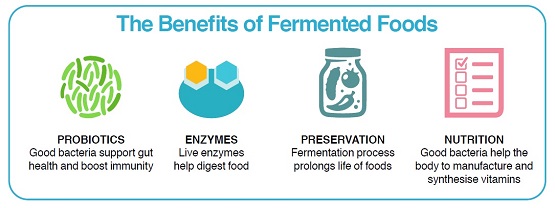What’s the Fuss About Fermented Foods?

We keep hearing about the supposedly boundless health-giving properties of fermented foods.
Dietitians from our Nutrition and Dietetics Department share their insights.
WHAT ARE ‘FERMENTED FOODS’?
In a nutshell, fermented foods are foods that have been altered by living microorganisms, such as bacteria, yeast and moulds. They include yoghurt, kefir and some cheeses. Some fermented foods such as kimchi, sauerkraut and sour pickles, along with yoghurt, kefir and kombucha, can contain 1 million to 1 trillion live microbes per gram. The microorganisms in other fermented foods, such as tempeh, most soy sauces, shelf-stable cheeses, beer and wine, are often killed by baking, pasteurisation or filtering.
THEIR MANY BENEFITS
Fermented foods deliver many benefits, including prolonging the shelf life of their raw ingredients. However, their primary benefit is related to their role in gut health. There is an overwhelming body of evidence that suggests gut health plays a much greater role in overall health than previously thought. Hence medical science is focusing on the benefits of ingesting live microorganisms, which fermented foods contain plenty of. Though many types of microorganisms exist in the gut, bacteria are the most studied.
When the live microorganisms in fermented foods travel through the digestive tract, they join the trillions that already exist within the gut. Many are killed by the acidic conditions but those that survive work tirelessly for, and sometimes against, the host’s body. They have many functions, from helping digest food to helping the body synthesise vitamins and boosting immunity through complex chemical reactions. Fermented foods are thought to help treat a vast array of conditions including diarrhea due to infection or medication, irritable bowel syndrome, Crohn’s disease and various digestive disorders. They may also have an indirect positive impact on a wide-ranging number of conditions, from depression and diabetes to urinary tract infections, osteoporosis and gingivitis. They are believed to also support heart health and skin health.

WHAT ABOUT PROBIOTICS
Probiotics are simply live microorganisms that are good for the gut. As fermented foods contain countless types of microorganisms, it is impossible to separate the good from the bad. Hence most foods are not permitted to be labelled ‘probiotic’ in most markets. However, certain fermented products labelled as probiotic supplements do contain only gut-friendly microorganisms. The good bacteria work hard to maintain the balance of the gut microbiome, but sometimes they are outnumbered by bad bacteria.
When the balance of good and bad bacteria in the gut is upset, digestive and overall health can suffer.
Common symptoms include constipation, bloating and diarrhoea. Long-term symptoms are thought to be far-reaching, possibly even life-threatening, and are still being studied. In such cases, taking probiotic supplements can help alleviate your symptoms of discomfort.
THE HEALTHY GUT

CAN I TAKE IT?
However, fermented foods or probiotic supplements are not for everyone. Individuals with a weakened immune system should avoid consuming such foods. This includes patients on immunosuppressive drugs, severely ill hospital patients or those recovering from certain medical procedures such as surgery. Additionally, if you are pregnant or notice any severe persistent side effects, discontinue use and consult a doctor.
RECOMMENDED FERMENTED FOODS

LIVEN UP YOUR DIET
It is a great idea to incorporate fermented foods in your diet. Their live cultures will support your digestive health, and their tangy flavours will liven up your taste buds. Do keep in mind that not all fermented foods contain live bacteria due to food processing or cooking. Therefore, always read the labels on foods prior to purchase – for example, choose yoghurt with active or live cultures such as Lactobacillus or Bifidobacterium. Look more closely and you will realise that such foods come in many different forms and are not hard to find. Common examples include Vitagen, Yakult and yoghurt products.
This article is taken from our My Alvernia Magazine Issue #42/43. Click here to read the issue on our website or on Magzter.



